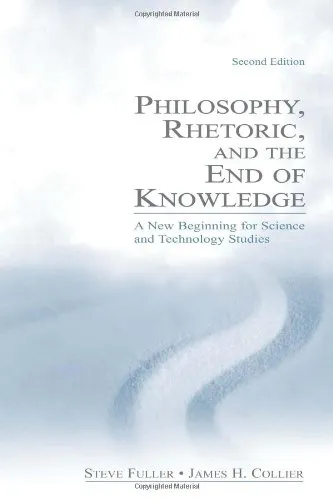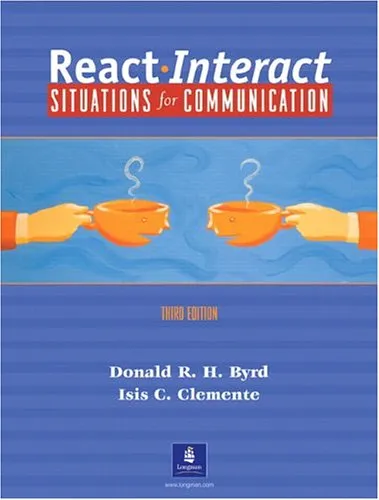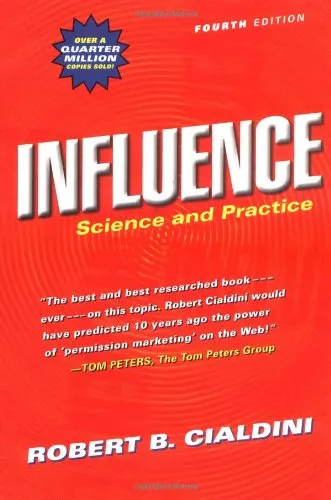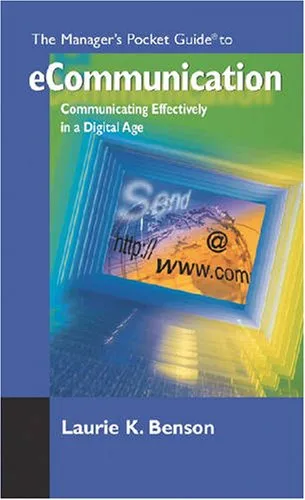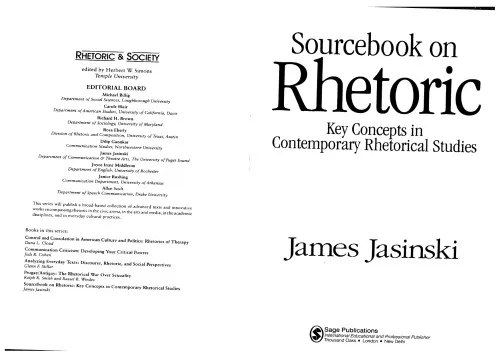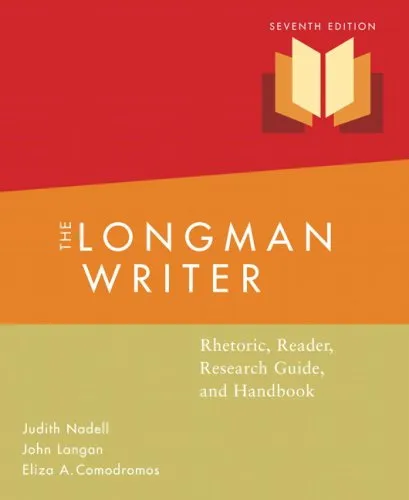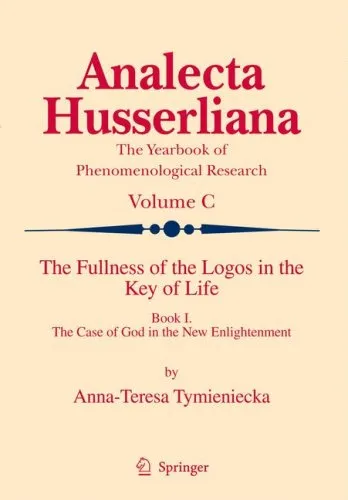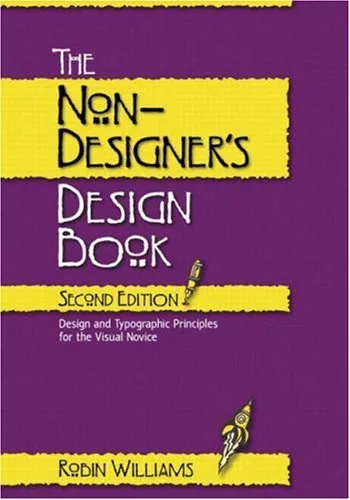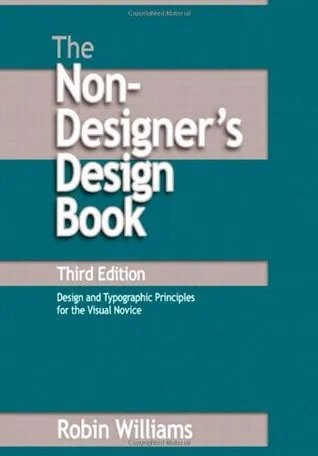Philosophy, Rhetoric, and the End of Knowledge: A New Beginning for Science and Technology Studies
4.0
بر اساس نظر کاربران

شما میتونید سوالاتتون در باره کتاب رو از هوش مصنوعیش بعد از ورود بپرسید
هر دانلود یا پرسش از هوش مصنوعی 2 امتیاز لازم دارد، برای بدست آوردن امتیاز رایگان، به صفحه ی راهنمای امتیازات سر بزنید و یک سری کار ارزشمند انجام بدینکتاب های مرتبط:
معرفی کتاب
کتاب Philosophy, Rhetoric, and the End of Knowledge: A New Beginning for Science and Technology Studies اثر استیو فولر و جیمز اچ. کالیر به عنوان یکی از آثار برجسته در مطالعات علم و تکنولوژی شناخته میشود. این کتاب به بررسی عمیق پیوند میان فلسفه، بلاغت (Rhetoric) و دانش میپردازد و به انتقاد از بنیادهای متافیزیکی رایج در علم میپردازد. نویسندگان این اثر، یک چارچوب جدید برای مطالعه علم و تکنولوژی ایجاد کردهاند که تأثیرات بلاغت و ارزشهای فرهنگی را در شکلگیری دانش علمی مورد تأکید قرار میدهد.
خلاصهای از کتاب
این کتاب به سه بخش کلیدی تقسیم میشود که هر یک از این بخشها درک جدیدی از ارتباط میان فلسفه، بلاغت و پایان دانش ارائه میدهند. نویسندگان در ابتدا به ریشههای تاریخی رابطه میان علم و بلاغت پرداخته و نشان میدهند که چگونه استدلال بلاغی از زمان ارسطو تا دوران مدرن همواره در پایه و اساس نظریههای علمی نقش داشته است. سپس، در بخشهای میانی کتاب، تأثیر ابزارهای فرهنگی و سیاستهای زبانی در ایجاد و گسترش علوم مورد بررسی قرار میگیرد. در نهایت، نویسندگان به مفهوم "پایان دانش" میپردازند و نشان میدهند که چگونه علم در قرن ۲۱ وارد فازی جدید شده است، که آینده آن نیازمند بازتعریف و بازاندیشی در ماهیت دانش و محدودیتهای آن است.
نکات کلیدی
- بررسی ریشههای تاریخی بلاغت و نقش آن در ایجاد نظریههای علمی.
- تأکید بر تأثیر ارزشهای فرهنگی و اجتماعی در شکلگیری دانش.
- تحلیل مفهوم "پایان دانش" به عنوان یک چارچوب مفهومی برای علم مدرن.
- مفهومپردازی دوباره درباره نقش فلسفه در تحلیل و نقد علم.
نقلقولهای مشهور از کتاب
"Rhetoric is not merely an art of persuasion but a framework to understand the very structure of knowledge production."
"Science rests not only on truths but on the rhetorical strategies used to render those truths as self-evident."
"The end of knowledge does not signify its demise but rather the point at which it must confront its own limitations and assumptions."
اهمیت این کتاب
کتاب Philosophy, Rhetoric, and the End of Knowledge یکی از مهمترین منابع فکری در مطالعه علم و تکنولوژی است که ضرورت بازاندیشی درباره روابط فلسفه، بلاغت و دانش را برجسته میکند. این اثر با به چالش کشیدن ایدههای سنتی در خصوص ماهیت علم، نه تنها برای دانشجویان و پژوهشگران علوم اجتماعی و انسانی مفید است، بلکه برای تصمیمگیرندگان و سیاستگذاران نیز ابزاری ارزشمند برای درک بهتر تأثیرات فرهنگی و اجتماعی تکنولوژی و علم ارائه میدهد.
این کتاب اهمیت ویژهای برای بازسازی رهیافتهای رشتههای مختلف در علوم انسانی دارد و بستری برای گفتگوی بینرشتهای میان فلسفه، علوم اجتماعی و مطالعات تکنولوژی فراهم میکند.
Introduction
"Philosophy, Rhetoric, and the End of Knowledge: A New Beginning for Science and Technology Studies" is a landmark text that bridges the intricate domains of philosophy, rhetoric, science, and technology studies (STS). Authored by Steve Fuller and James H. Collier, this book investigates the evolving epistemological frameworks that define the modern scientific enterprise. Its bold approach challenges traditional assumptions, offering readers a critical and innovative exploration of how knowledge is constructed, communicated, and legitimized in scientific and technological contexts.
The book is essential for interdisciplinary audiences interested in the intersections of epistemology, sociology of knowledge, and communication theories. By redefining how we perceive the rhetoric of science, the authors encourage scholars, policymakers, and practitioners to rethink the way scientific knowledge interacts with societal needs and values. The book's ambitious goal of reconceptualizing STS is both timely and provocative, especially in an era where epistemological stability is increasingly questioned by rapid advancements in science and technology.
Detailed Summary of the Book
The book unfolds in a systematic yet thought-provoking manner, providing a compelling critique of contemporary science while offering new directions for understanding its potential.
Fuller and Collier start by addressing the historical trajectory of epistemology and its dependence on Cartesian ideals of objectivity. They argue that these ideals are becoming obsolete as science advances into new methodological territories. Through nuanced discussions, they suggest that the current enterprise of knowledge production is steeped in rhetoric, a fact often overlooked or dismissed in favor of so-called "neutral" scientific methods.
The authors weave together diverse theories, drawing from classical philosophy, postmodern critiques, and contemporary social sciences. They propose that rhetoric should no longer be seen as peripheral to knowledge-making but as central to how scientific ideas gain traction and legitimacy. By emphasizing the persuasive dimensions of scientific rhetoric, they reveal how knowledge is as much a product of communicative strategies as it is of experimentation and reasoning.
Additionally, the book explores the implications of this rhetorical understanding of science for public policy, technology development, and education. In doing so, it provides a framework that not only critiques but also equips readers with tools for engaging with science and technology in productive and socially responsible ways.
Key Takeaways
- The construction of knowledge is deeply intertwined with rhetorical practices.
- Science and technology require interdisciplinary approaches to fully appreciate their societal impacts.
- Objective knowledge, as traditionally understood, is being redefined in the face of scientific and technological advancements.
- Rhetoric is not merely a tool for persuasion but a foundational element of knowledge production.
- A new framework for Science and Technology Studies is crucial for addressing contemporary epistemological challenges.
Famous Quotes from the Book
Here are some thought-provoking excerpts that capture the essence of this groundbreaking work:
"Knowledge is neither purely discovered nor invented—its creation is steeped in the art of persuasion."
"The end of knowledge is not a termination but a transformation, urging us to rethink the purpose and potential of science in an interconnected world."
"Science, long heralded as the objective pursuit of truth, emerges here as a rhetorical enterprise embedded in societal norms and values."
Why This Book Matters
The significance of "Philosophy, Rhetoric, and the End of Knowledge" lies not only in its intellectual rigor but also in its timely message for contemporary discussions of science, technology, and society.
In a world increasingly driven by data, algorithms, and technological progress, how we understand and utilize knowledge is more critical than ever. This book provides a profound yet accessible critique of traditional epistemological models, urging readers to appreciate the social and rhetorical dimensions of scientific inquiry. It challenges the prevailing notion of objectivity, offering instead a vision of science that is inclusive, adaptable, and attuned to societal needs.
Moreover, the book's interdisciplinary framework makes it relevant to a wide range of audiences, from philosophers and social scientists to technologists and policymakers. By questioning the foundations of knowledge creation, the book opens up possibilities for innovative approaches to problem-solving and decision-making in an age of complexity and uncertainty.
In essence, "Philosophy, Rhetoric, and the End of Knowledge" is a call to action—a reminder that the future of science and technology depends on our willingness to embrace critical thinking and collaborative engagement.
دانلود رایگان مستقیم
شما میتونید سوالاتتون در باره کتاب رو از هوش مصنوعیش بعد از ورود بپرسید
دسترسی به کتابها از طریق پلتفرمهای قانونی و کتابخانههای عمومی نه تنها از حقوق نویسندگان و ناشران حمایت میکند، بلکه به پایداری فرهنگ کتابخوانی نیز کمک میرساند. پیش از دانلود، لحظهای به بررسی این گزینهها فکر کنید.
این کتاب رو در پلتفرم های دیگه ببینید
WorldCat به شما کمک میکنه تا کتاب ها رو در کتابخانه های سراسر دنیا پیدا کنید
امتیازها، نظرات تخصصی و صحبت ها درباره کتاب را در Goodreads ببینید
کتابهای کمیاب یا دست دوم را در AbeBooks پیدا کنید و بخرید
1271
بازدید4.0
امتیاز0
نظر98%
رضایتنظرات:
4.0
بر اساس 0 نظر کاربران
Questions & Answers
Ask questions about this book or help others by answering
No questions yet. Be the first to ask!
